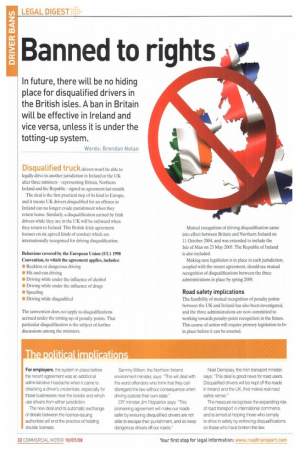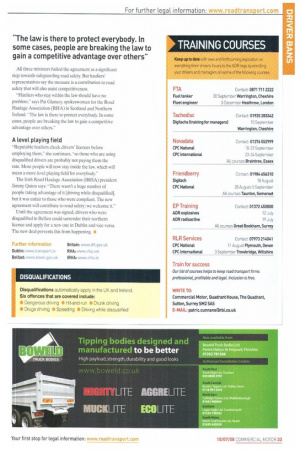Banned to rights
Page 32

Page 33

If you've noticed an error in this article please click here to report it so we can fix it.
In future, there will be no hiding place for disqualified drivers in the British isles. A ban in Britain will be effective in Ireland and vice versa, unless it is under the totting-up system.
Words: Brendan Nolan
Disqualified truck drivers won't be able to legally drive in another jurisdiction in Ireland or the UK after three ministers— representing Britain, Northern Ireland and the Republic — signed an agreement last month.
The deal is the first practical step of its kind in Europe, and it means UK drivers disqualified for an offence in Ireland can no longer evade punishment when they return home. Similarly, a disqualification earned by Irish drivers while they are in the UK will be enforced when they return to Ireland. This British-Irish agreement focuses on six agreed kinds of conduct which are internationally recognised for driving disqualification.
Behaviour covered by the European Union (EU) 1998 Convention, to which the agreement applies, includes: • Reckless or dangerous driving • Hit-and-run driving • Driving while under the influence of alcohol • Driving while under the influence of drugs • Speeding • Driving while disqualified The convention does not apply to disqualifications accrued under the totting-up of penalty points. That particular disqualification is the subject of further discussions among the ministers, Mutual recognition of driving disqualification came into effect between Britain and Northern Ireland on 11 October 2004, and was extended to include the Isle of Man on 23 May 2005. The Republic of Ireland is also included.
Making sure legislation is in place in each jurisdiction, coupled with the recent agreement, should see mutual recognition of disqualifications between the three administrations in place by spring 2009.
Road safety implications
The feasibility of mutual recognition of penalty points between the UK and Ireland has also been investigated, and the three administrations are now committed to working towards penalty-point recognition in the future. This course of action will require primary legislation to be in place before it can be enacted. All three ministers hailed the agreement as a significant step towards safeguarding road safety. But hauliers' representatives say the measure is a contribution to road safety that will also assist competitiveness.
"Hauliers who stay within the law should have no problem," says Pat Glaneey, spokeswoman for the Road Haulage Association (RHA) in Scotland and Northern Ireland. "The law is there to protect everybody. In some cases, people are breaking the law to gain a competitive advantage over others."
A level playing field "Reputable hauliers check drivers' licences before employing them," she continues, "so those who are using disqualified drivers are probably not paying them the rate. More people will now stay inside the law, which will mean a more level playing field for everybody."
The Irish Road Haulage Association (IRHA) president Jimmy Quinn says: "There wasn't a huge number of people taking advantage of it [driving while disqualified]. but it was unfair to those who were compliant. The new agreement will contribute to road safety: we welcome it."
Until the agreement was signed, drivers who were disqualified in Belfast could surrender their northern licence and apply for a new one in Dublin and vice versa. The new deal prevents this from happening. • Further information Britain: vww.dft.gov.uk Dublin: www.transportie RHA: ,w.rha.net Belfast: www.doen .gov.uk IRHA:








































































































































































